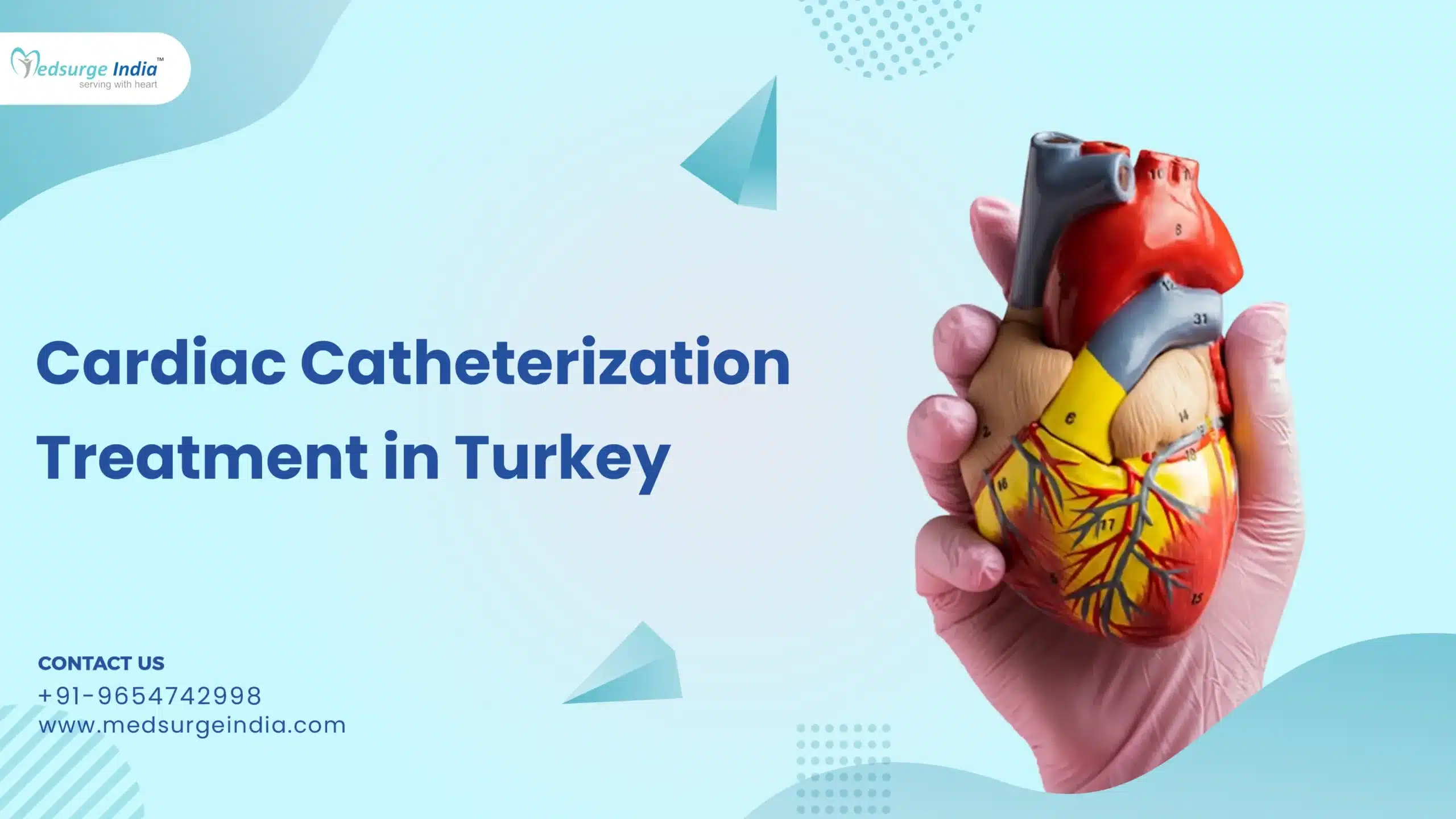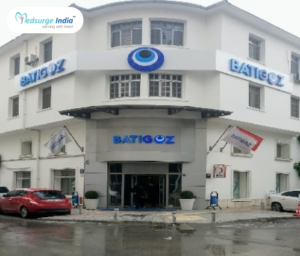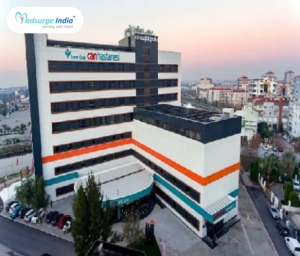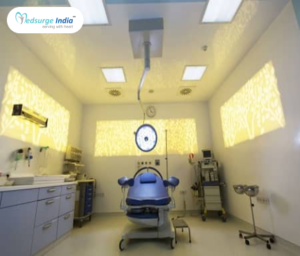Cardiac Catheterization Treatment Cost in Turkey
Unlock Exclusive Discount : Your Gateway to Premium Healthcare with Medsurge India Health Value Card.

Unlock Exclusive Discount : Your Gateway to Premium Healthcare with Medsurge India Health Value Card.


Cardiac Catheterization, commonly referred to as Coronary Angiogram, Cardiac Cath, or Heart Catheterization, is a diagnostic method employed to assess the health of the heart. During this procedure, a slender, flexible, and hollow tube known as a catheter is introduced through the patient’s leg, arm, or groin and guided to the coronary artery.
Here we will delve into the cost of cardiac catheterization treatment in Turkey, its factors, how the treatment is done and why may patients opt for Turkey as their destination. Continue to learn more.
Cardiac catheterization treatment cost in Turkey start from 7000 USD to 13,000 USD depending on the patient’s conditions, the location of the hospital, and other several factors.
| Cities | Prices |
| Istanbul | $7200 to $13,000 |
| Antalya | $7500 to $12,000 |
| Izmir | $7500 to $12,000 |
| Ankara | $7000 to $12,500 |
Listed here are some of the main factors that can affect cardiac catheterization treatment cost in Turkey. Read as we have written a detailed breakdown of cardiac catheterization treatment cost in Turkey:
Treatment Type: Different treatments are tailored to tackle specific heart issues. The complexity and nature of the treatment significantly influence the overall cost of cardiac catheterization treatment in Turkey.
Hospital Location: The cost of living and operational expenses vary across different cities and regions in Turkey. As a result, the location of the hospital can greatly affect the total treatment cost of cardiac catheterization treatment in Turkey.
Treatment Duration: The financial burden can increase if the treatment involves multiple sessions, resulting in higher overall expenses for the patient.
Technology and Equipment: Utilizing cutting-edge technology and advanced equipment during treatments can raise costs. However, these innovative methods often lead to better outcomes, which can justify the higher expenses.
The severity of the Condition: The seriousness of the heart issue and the level of treatment required will affect the total cost. More severe conditions may necessitate additional sessions and products, leading to greater financial investment.
Aftercare Needs: Some treatments require aftercare, which may include medications, follow-up visits, or specialized products for hair care. These additional costs can included in the overall budget for cardiac catheterization treatment in Turkey.
Cardiac catheterization is a diagnostic procedure utilized to address various heart and vascular issues, including arrhythmias and arterial blockages. This procedure involves the insertion of a slender, flexible tube known as a catheter, which is navigated through the blood vessels to reach the heart.
There are two primary types of cardiac catheterization:
Heart catheterization is utilized to identify a range of cardiovascular issues, including narrowed blood vessels, weakened heart muscles, and damaged heart valves. Your physician may recommend arterial cardiac catheterization to investigate the following conditions:
Prior to the examination, you will receive medication to help you relax. Healthcare providers will typically prepare a site on your arm, neck, or groin by cleaning and sterilizing the area before placing an intravenous (IV) line. Initially, a sheath, which is a larger, thinner plastic tube, is inserted into the artery of your leg or arm. Following this, a catheter, a longer plastic tube, is inserted into the sheath and guided to the heart using fluoroscopy, allowing the doctor to maneuver it effectively. Once this is accomplished, the doctor will proceed with the following diagnostic procedures:
If angioplasty is performed to remove a blockage, a stent may be placed. The examination typically lasts between 30 to 60 minutes, but the duration may be extended if additional, non-standard procedures are necessary.
After your diagnosis is finalized, your physician will reach out to schedule a follow-up appointment once the reports are available. During this meeting, they will review your condition and discuss potential treatment options.
On average, a cardiac catheterization procedure, including angiography, lasts about 20-30 minutes and is usually conducted as an outpatient procedure on the same day. However, some cases may require additional time, and a brief hospital stay might be necessary for certain patients.
Although the procedure itself lasts about 30 minutes, the preparation and recovery time can take several hours. Plan to spend the entire day at the hospital and arrange for a ride home afterward. You will receive guidelines on what you can and cannot eat or drink in the 24 hours leading up to your heart catheterization, and you will likely need to fast for at least six to eight hours before the procedure.
Inform your doctor about all medications you are taking, including over-the-counter drugs. Do not stop taking any medications unless your doctor instructs you to do so; you may be advised to continue them until after the procedure. If you have any allergies, especially to iodine, latex, rubber, or specific medications, make sure the nurse performing the procedure is aware. If you usually wear a hearing aid, do not forget to bring it, and also take your glasses if you need them.
There is a slight risk that a cardiac catheterization could affect an unborn child, so it’s crucial to discuss your pregnancy status with your doctor. Exposure to radiation during pregnancy has been associated with a higher risk of birth defects. If you are breastfeeding, inform your doctor as well.
In rare instances, patients may have an allergic reaction to the dye used during the procedure. Be sure to tell your doctor about any allergies or sensitivities you have, including to medications, contrast dye, iodine, or latex. Additionally, let your doctor know if you have kidney problems or renal failure.
Some patients may feel discomfort or pain from having to lie still on the cardiac cath table throughout the procedure. Depending on your health condition, there may be other potential side effects and risks. Discuss any concerns you have with your doctor before the procedure.
In the cardiac catheterization procedure, a nurse will start by inserting an intravenous (IV) line into a vein in your arm to administer medication. This medication will help keep you sedated, ensuring your comfort throughout the procedure. The level of sedation required may vary based on the specific reasons for the procedure. Following this, the nurse will prepare the insertion site by shaving and sanitizing the area where the catheter will be introduced.
Initially, the doctor will insert a needle into your blood vessel and then place a guidewire through the needle before removing the needle itself. Next, a sheath, which is a small tube, will be positioned around the guidewire and inserted into the blood vessel, after which the guidewire is removed. Subsequently, a catheter is introduced through the sheath. The doctor will then carefully maneuver the catheter toward the heart.
Various instruments may be attached to the catheter’s tip to facilitate different procedures, including monitoring blood pressure in each heart chamber and the veins leading to the heart, visualizing the interior of the blood vessels, drawing blood samples from different areas of the heart, and conducting procedures such as biopsies, stent placements, and angioplasty.
Once the procedure is finished, your physician will carefully extract the catheter, sheath, and guidewire. Following this, pressure may be applied to the insertion site to control any bleeding. You will then be moved to the recovery room, where you can rest until the anesthesia wears off. Your blood pressure and heart rate will be monitored for several hours to ensure there are no adverse effects from the procedure.
If the catheter was inserted through your groin, you will be required to lie flat on your back with your legs straight for 3 to 6 hours to prevent excessive bleeding. Your doctor will advise you to drink plenty of water to help flush out the contrast dye used during the procedure, which may lead to more frequent urination.
The possible risks associated with a cardiac catheterization procedure include:
Also Read:- Top Cardiologists in Turkey
For individuals seeking top-tier infertility solutions, Medsurge India stands out as a leading choice. Our organization not only features a team of highly qualified experts but also offers a comprehensive approach to meet all your needs.
Patients select us for cardiac catheterization treatment in Turkey for several compelling reasons:
A: Heart catheterization is commonly performed to identify and address various heart-related issues. If you experience arrhythmias, angina, or problems with heart valves, your physician may recommend this procedure.
A: When performed by a skilled medical team, cardiac catheterization is generally considered safe. Nonetheless, there are inherent risks, such as infection, bleeding, or the formation of blood clots. In rare cases, complications like a heart attack or stroke may arise, but these events typically occur under careful medical supervision in a hospital setting.
A: Post-procedure bed rest recommendations can vary, typically ranging from 3 to 12 hours, and in some cases, extending beyond 24 hours. This requirement can be uncomfortable for patients, increase the burden on caregivers, and prolong hospital stays.
A: Yes, it is essential to refrain from smoking or using any tobacco products for at least 48 hours before the procedure. Additionally, you should inform your doctor about any regular alcohol consumption.

Pediatric Cardiologist
Senior Consultant
43+ Years
Medicana Bursa Hospital, Ankara
View Doctor
Pediatric Cardiologist
Senior Consultant
43+ Years
Medicana Bursa Hospital, Ankara
View Doctor
Pediatric Cardiologist
Consultant
20+ Years
Medicana Bursa Hospital, Ankara
View Doctor
Pediatric Cardiologist
Senior Consultant
46+ Years
Medicana Bursa Hospital, Ankara
View Doctor
Interventional Cardiologist
Consultant
41 years of experience
Batigoz Eye Hospital Balcova
View Doctor
Cardiac Surgeon
Consultant
25 years of experience
Derindere Hospital, Istanbul
View DoctorPediatric Cardiac Surgeon
Consultant
40 years of experience
Can Hospital, Istanbul
View DoctorCardiac Surgeon
Consultant
25 years of experience
Can Hospital, Istanbul
View DoctorCardiac Surgeon
Associate Professor
15 years of experience
Yeditepe University Healthcare Institutions, Istanbul
View DoctorCardiac Surgeon
Consultant
20 years of experience
Ozel Saglik Hastanesi
View Doctor









By using our site, you agree to our Terms and Conditions, Privacy Policy and Refund Policy. Medsurgeindia does not provide medical advice, diagnosis, or treatment. The information provided on this site is designed to support, not replace, the relationship that exists between a patient/site visitor and his/her existing physician. We also Accept International Payments.

Copyright © 2025 NSM ONLINE SOLUTIONS PRIVATE LIMITED. All rights reserved.